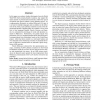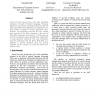300 search results - page 19 / 60 » Extracting Patterns and Relations from the World Wide Web |
INTERSPEECH
2010
13 years 5 months ago
2010
In this paper, we analyze whether dictionaries from the World Wide Web which contain phonetic notations, may support the rapid creation of pronunciation dictionaries within the sp...
JCDL
2011
ACM
13 years 1 months ago
2011
ACM
A pattern is a model or a template used to summarize and describe the behavior (or the trend) of a data having generally some recurrent events. Patterns have received a considerab...
ACL
2008
13 years 11 months ago
2008
Traditional Information Extraction (IE) takes a relation name and hand-tagged examples of that relation as input. Open IE is a relationindependent extraction paradigm that is tail...
HICSS
2005
IEEE
14 years 4 months ago
2005
IEEE
During the past decade there have been significant advances in the field of Natural Language Processing (NLP) and, in particular, Information Extraction (IE) [2] which have fueled...
WEBNET
1998
13 years 11 months ago
1998
Assistance in retrieving of documents on the World Wide Web is provided either by search engines, through keyword based queries, or by catalogues, which organise documents into hi...


